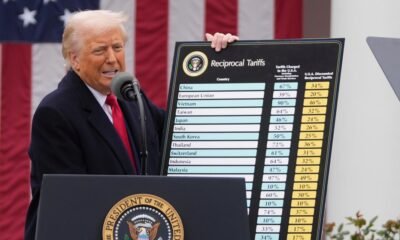Business
Federal Judge Rules: Google Abused Monopoly Power to Control Online Search

A monumental verdict in a federal antitrust case has struck a blow against Google’s grip on internet search, shaking the tech industry’s foundations.
U.S. District Judge Amit P. Mehta delivered the ruling on Monday, laying bare the ways Google has maintained its stronghold. While acknowledging Google’s success through innovation and strategic moves, Mehta honed in on the company’s use of default distribution deals to outmaneuver rivals.
Google, headquartered in Mountain View, California, had inked agreements with companies like Apple to make its search engine the default on phones and browsers. These deals included sharing advertising revenue generated from searches, giving Google an unseen yet substantial advantage in the market.
“Google is a monopolist, and it has acted as one to maintain its monopoly,” Mehta asserted.
The decision follows a 10-week bench trial that began in September 2023 in the U.S. District Court for the District of Columbia. This ruling marks a pivotal victory for regulators aiming to reduce Big Tech’s clout in the digital landscape.
Attorney General Merrick Garland emphasized that the judgment underscores the principle that no company is above the law. “This victory against Google is a historic win for the American people,” he proclaimed.
Jonathan Kanter, the Justice Department’s antitrust chief, hailed the decision as a significant step toward fostering innovation and safeguarding public access to information.
Federal prosecutors depicted Google, valued at $1.7 trillion, as a monopoly wielding substantial control over more than 90% of internet searches. Microsoft’s Bing, its closest rival, accounts for about 6% of searches.
The trial unearthed evidence, including a 2005 email where Google’s lawyers criticized Microsoft for making MSN Search the default on Internet Explorer 7. Ironically, these concerns mirrored the federal government’s arguments against Google’s default deals.
Additionally, the government highlighted Google’s dominance in search advertising since its inception in 1998, forcing marketers towards its platforms while inflating prices.
During the trial, Google CEO Sundar Pichai insisted the company engages in robust competition, despite its default-distribution agreements. Google’s defense, led by attorney John Schmidtlein, claimed the company’s market position stemmed from its superior product.
“The [default] payments are the reflection of competition,” Schmidtlein argued.
Despite the ruling, Google’s president of global affairs, Kent Walker, announced plans to appeal. “This decision recognizes that Google offers the best search engine, but concludes that we shouldn’t be allowed to make it easily available,” Walker stated.
The judge is expected to schedule a further trial to determine Google’s penalties, potentially leading to significant fines or the breakup of parts of the company.
Senator Bernie Sanders weighed in on the verdict, calling for the dismantling of Google’s empire. “Google may be a $2 trillion corporation. Its founders may be worth $292 billion,” Sanders remarked. “But it’s not above the law. It’s time to hold Google accountable and break it up.”


















